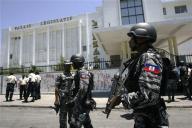PORT-AU-PRINCE (Reuters) – Haiti’s government fell on Saturday when senators fired the prime minister after more than a week of riots over food prices, ignoring a plan presented by the president to slash the cost of rice.
| ADVERTISEMENT <SCRIPT language=’JavaScript1.1′ SRC=”http://ad.doubleclick.net/adj/N1942.yahoo.comSD1509/B2420871.5;abr=!ie;sz=300×250;dcopt=rcl;click=http://us.ard.yahoo.com/SIG=14t06c1q7/M=636423.12285607.12698783.1414694/D=news/S=7666528:LREC/_ylt=A0WTUZlrbgNIKu0A2Rpg.3QA/Y=YAHOO/EXP=1208191627/L=rXUQDEWTVvoC2z.O9FN3Zwy4VKGNaEgDbmsAB3fj/B=mrp8E0WTWUQ-/J=1208184427499807/A=5230541/R=1/*;ord=1208184427499807″> </SCRIPT> <NOSCRIPT> <A HREF=”http://us.ard.yahoo.com/SIG=14t06c1q7/M=636423.12285607.12698783.1414694/D=news/S=7666528:LREC/_ylt=A0WTUZlrbgNIKu0A2Rpg.3QA/Y=YAHOO/EXP=1208191627/L=rXUQDEWTVvoC2z.O9FN3Zwy4VKGNaEgDbmsAB3fj/B=mrp8E0WTWUQ-/J=1208184427499807/A=5230541/R=2/SIG=13k4lro4s/*http://ad.doubleclick.net/jump/N1942.yahoo.comSD1509/B2420871.5;abr=!ie4;abr=!ie5;sz=300×250;ord=1208184427499807?”> <IMG SRC=”http://ad.doubleclick.net/ad/N1942.yahoo.comSD1509/B2420871.5;abr=!ie4;abr=!ie5;sz=300×250;ord=1208184427499807?” BORDER=0 WIDTH=300 HEIGHT=250 ALT=”Click Here”></A> </NOSCRIPT> |

Sixteen of 17 senators at a special session voted against Prime Minister Jacques Edouard Alexis, an ally President Rene Preval placed at the head of a coalition cabinet in June 2006 that was meant to unite the fractious Caribbean nation.
The move by opposition senators was seen as a serious but not crushing blow to Preval, whose 2006 election brought a measure of calm to the poorest country in the Americas as it searched for political stability after decades of dictatorship, military rule and economic mayhem.
The clash with senators came after the president of the country of 9 million people — most of whom earn less than $2 a day — managed to persuade rioters to end a week of violence in which at least five people were killed.
Stone-throwing crowds began battling U.N. peacekeepers and Haitian police in the south on April 2, enraged at the soaring cost of rice, beans, cooking oil and other staples.
The unrest spread this week to the capital, Port-au-Prince, bringing the sprawling and chaotic city to a halt as mobs took over the streets, smashing windows, looting shops, setting fire to cars and hurling rocks at motorists.
U.N. troops, stationed in Haiti since Jean-Bertrand Aristide was ousted as president in a revolt in 2004, fired tear gas and rubber bullets on several occasions to disperse protesters.
On Saturday a Nigerian U.N. peacekeeper was shot to death near the main Catholic cathedral in downtown Port-au-Prince, close to the large and often violent slum of Bel-Air, a Haitian police officer and U.N. commander said.
The circumstances of the shooting were unclear and the city appeared largely tranquil. Three Sri Lankan peacekeepers were struck by bullets on Thursday but were not seriously injured.
MANY HAITIANS WELCOME OUSTER
“Now it’s my turn to play,” Preval said when he was told by journalists of the Senate vote shortly after he and private sector leaders unveiled a plan to cut the cost of a sack of rice to $43 from $51.
Three dollars of the price cut would be paid for by businesses and the rest by international donors, he said.
Preval said he would ask parliament to pick a new prime minister. Alexis was seen as a pragmatist and dealmaker, and also served as prime minister during Preval’s first term as president from 1996 to 2001.
Many Haitians seemed to welcome the ouster of Alexis.
“When he was prime minister, he did nothing to lower the high cost of living. I hope things will change with a new prime minister,” said Jean Pierre Jean-Baptiste, 29, an electrician.
Sen. Youri Latortue, a nephew of a former prime minister and leader of Saturday’s vote, said Alexis had failed to ramp up food production, protect people against crime, heed calls to establish a new national security force and set a deadline for the U.N. troops to leave.
‘EVERYONE HAS TO MAKE A SACRIFICE’
Disturbances over high food prices have broken out in several poor countries, primarily in Africa. Record oil prices, rising demand for food in Asia, the use of farmland and crops for biofuels and other factors such as market speculation have pushed up food prices worldwide.
“The situation is difficult everywhere around the world, everyone has to make a sacrifice,” Preval said on Saturday as he announced the plan to cut rice prices in a room adorned with crystal chandeliers and thick drapes at the National Palace.
Preval reiterated that Haiti could not afford to cut taxes on food because it needed the revenue to pay for longer-term projects that create jobs and boost agriculture.
It was unclear whether the price cut would satisfy protesters.
“It has not been lowered enough,” said a young man who identified himself only as Givens. “If they don’t further lower the price I think people are going to protest more. There will be problems, more unrest. Even the National Palace could be set on fire because we are in trouble.”
(Additional reporting by Jean Valme; Writing by Michael Christie; Editing by Xavier Briand)
(For more stories on global food price rises, please see http://www.reuters.com/news/globalcoverage/agflation)
By Joseph Guyler Delva and Jim Loney Sat Apr 12, 6:50 PM ET
Source: Reuters